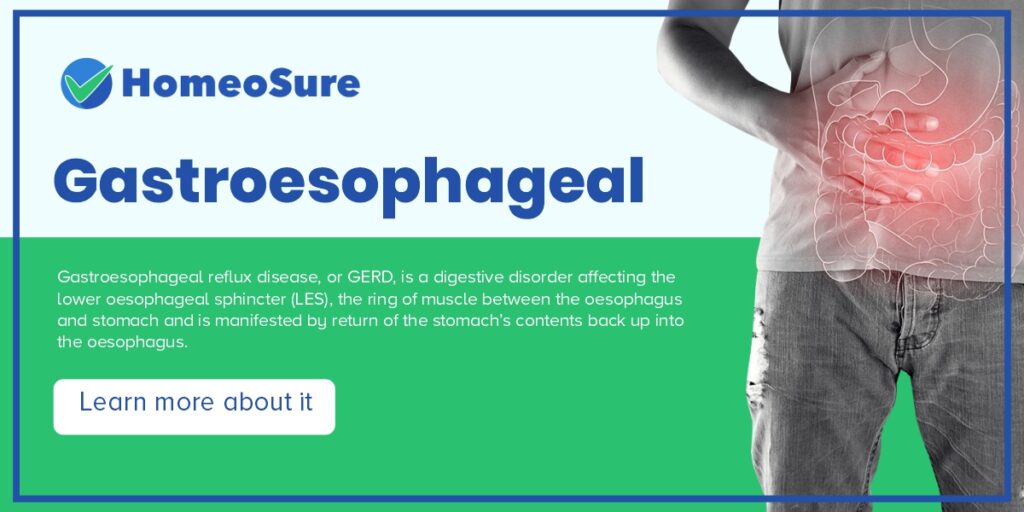Gastroesophageal
Gastroesophageal reflux disease, or GERD, is a digestive disorder affecting the lower oesophageal sphincter (LES), the ring of muscle between the oesophagus and stomach and is manifested by return of the stomach’s contents back up into the oesophagus.
In normal digestion, the lower oesophageal sphincter (LES) opens to allow food to pass into the stomach and closes to prevent food and acidic stomach juices from flowing back into the oesophagus. Gastroesophageal reflux occurs when the LES is weak or relaxes inappropriately, allowing the stomach’s contents to flow up into the oesophagus.
SYMPTOMS OF GERD
- Heartburn, commonly referred to as acidity, felt in the middle of the chest, specially post meals
- Regurgitation, i.e. appearance food contents in the mouth
- Nausea with or without vomiting
- Sometimes pain or discomfort
- May produce lot of mucus which may mimic Pharyngitis
GERD CAN LEAD TO
- Ulcers: Inflammation of the oesophagus can cause ulceration and may lead to bleeding
- Stricture: After healing of the ulcers, scars are formed leading to strictures (narrowing of the food pipe)
- Barrett’s Oesophagus: GERD of very long duration may cause changes in the cells of the oesophagus leading to Barrett’s Oesophagus that is a strong precursor to Cancer
- Respiratory Troubles: Long-standing GERD may precipitate cough and asthma, and may also cause inflammation of throat
- Oesophageal adenocarcinoma – a form of cancer
CAUSES OR RISK FACTORS OF GERD
The following factors may increase your risk of developing GERD:
- Being overweight or obese
- Eating large amounts of fatty foods
- Smoking, alcohol, coffee or chocolate
- Pregnancy
- Hiatus hernia
- Gastroparesis – when the stomach takes longer to get rid of stomach acid, which means excess acid can leak up into the oesophagus
- Certain medicines – some medicines can cause GERD or make the symptoms worse, including calcium-channel blockers (used to treat high blood pressure), nitrates (used to treat angina) and non-steroidal anti-inflammatory drugs (NSAIDs)
- Stress
PREVENTION AND CONTROL OF GERD
Various lifestyle changes can help modify or relieve symptoms of GERD like:
- Eat smaller and more frequent meals
- Don’t eat or drink alcohol within three or four hours before going to bed, and avoid having your largest meal of the day in the evening.
- Avoid anything you think triggers your symptoms – common triggers include coffee, chocolate, tomatoes, alcohol, and fatty or spicy food.
- Don’t wear tight clothing
- Raise the head of your bed
- Try to relax – stress can make heartburn and GORD worse, so learning relaxation techniques may help if you’re often feeling stressed.
- Maintain a healthy weight – if you’re overweight, losing weight may help reduce your symptoms.
- Stop smoking – smoke can irritate your digestive system and may make your symptoms worse
HOMEOPATHIC TREATMENT
Homeopathy is very efficient in managing symptoms of GERD and has excellent success rate in the treatment of GERD. It also helps in preventing relapse of the condition.
Homeopathic treatment is targeted towards UPROOTING THE DISEASE and ensuring health with no side effects. For prescribing to an individual, a PLAN OF TREATMENT is followed which involves:
- GETTING THOROUGH UNDERSTANDING OF CASE which includes complete case taking (analyzing patient as an individual) along with patient history and family history
- DIAGNOSIS OF PATIENT AND DISEASE
- INDIVIDUAL ASSESSMENT OF THE CASE
- PRESCRIBING THE MOST SUITABLE INDIVIDUAL CONSTITUTIONAL REMEDY
